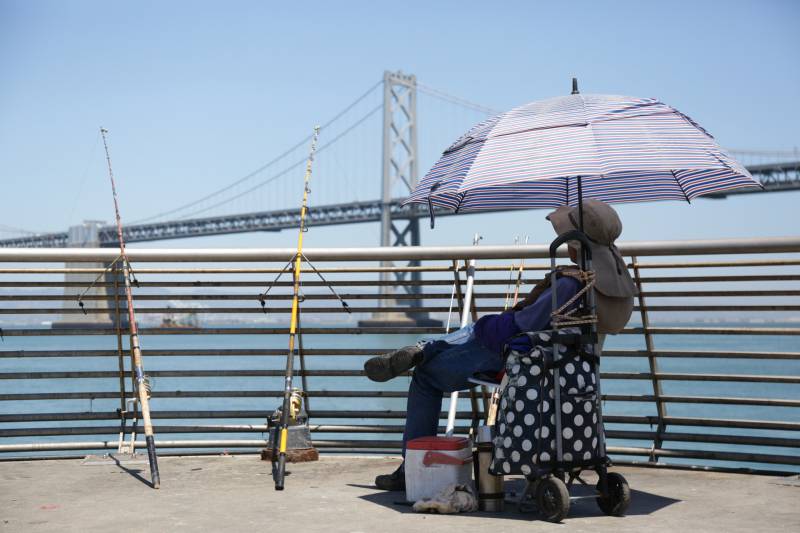“Of all the extreme weather events that are tied to climate change, heat waves are the ones that are most telling,” says Sean Sublette, meteorologist at the science and news organization Climate Central. “That’s the kind of event that ties most directly to a warming climate. Just statistically, if the overall temperature of the planet is going up, you’re going to have hotter spells than you had in the past.”
What Does Science Tell Us About the Long-term Trends for Heat Waves?
They’ll increase: in how hot they get, in how long they last, and in how frequently they happen. We do have some control here, however. One way is through mitigation.
“Mitigation is actually reducing how much greenhouse gases we are putting out into the atmosphere,” says Jane Baldwin, assistant professor of Earth Systems Science at the UC Irvine. “And hopefully at some point reducing the actual levels of greenhouse gases in the atmosphere, which would reduce global warming and in turn curtail these trends.”
Climate Central’s Sublette says society would need to make rapid and dramatic changes to perhaps experience a leveling off of warming before the century’s end. “Look, there’s room for some optimism,” he says. “We’ve made big changes in society before. So this can be done. We just have to decide that it’s important.”
Secondly, we have control over how we adapt to heat waves.
“The good news here is that there is a fair amount of evidence that heat wave related health impacts, at least, are largely preventable,” Baldwin adds.
Here are some tips on how to protect yourself during a heatwave.
How are Heat Waves Dangerous?
Humans can acclimatize to very hot temperatures — if they are well adjusted, generally healthy and hydrated, then their bodies can manage heat up to a point. It takes about two weeks to acclimatize to new climates or sudden temperature changes. For people with certain pre-existing conditions, or those in more vulnerable groups, dealing with heat can be harder.
Here’s what’s happening inside a person’s body when confronting high temperatures.
When their blood warms, the brain signals the body to shift blood flow, moving heat away from vital organs, like the brain, heart, and lungs, to the surface of the body. This triggers sweating, and resulting evaporation, the final step of moving heat from the body into the outside environment.
We run into problems when these physiological systems fail. Certain groups of people are more vulnerable to heat than others, including:
-
- Older adults. We become less able to adjust to heat the more we age. Older adults are also at risk due to social isolation, therefore it is essential that family, neighbors, and friends check on elderly people who live alone during a heat wave, making sure they can access a cooling center if needed.“Even if you don’t know them well, try to make that connection, even if it’s just getting a phone number ahead of time and then just calling and checking,” says Helene Margolis, associate adjunct professor of medicine at UC Davis School of Medicine.
- Children. Check in on what your kid’s schools or extracurricular groups are doing to make sure they’re safe from heat. Children don’t perceive thirst as well as adults, so remind them to drink water.
- Teenage and young adult athletes. This group has higher instances of death from heat illnesses due to exertion.
- People with some pre-existing conditions. These include heart disease, high blood pressure, chronic obstructive pulmonary disease, asthma, obesity and diabetes. Taking certain common medications also puts some people at greater risk for heat illness.
Beyond these categories, environmental factors also increase someone’s risk for heat illness, such as living in what are known in the public health world as “heat islands.” These neighborhoods typically have lots of heat-trapping asphalt and concrete, fewer trees and green spaces, and can be five or more degrees hotter than surrounding areas. Heat islands are often in urban centers, but can be outside of them too.
Even without a major heat spike, people living in these areas can suffer due to persistent heat, especially if buildings don’t cool down well at night, giving their bodies time to recover.
“People are getting sick from the heat. It’s causing them to go to emergency rooms,” says Jen Brady, senior data analyst at Climate Central.
If our body temperature reaches 103-104 degrees Fahrenheit, we are at risk of heat illness and heat stroke, which can be deadly.
If you or someone you know exhibits symptoms of heat stroke, call 911 immediately. Symptoms are: a temperature over 103 degrees; red, hot, dry or damp skin; fast pulse; nausea; headache; dizziness; confusion; or passing out. While waiting for help, move the person to a cooler area and help them reduce their temperature with a shower or wet towels. Do not give them anything to drink as they could pass out, and the liquid could obstruct their airway. More symptoms of other kinds of heat-related illnesses, and what to do if you see them, are listed on the website of the Centers for Disease Control and Prevention.
Heat fatalities are underreported, say meteorologist Sublette, because they are not as visually gripping as tornadoes or hurricanes.

